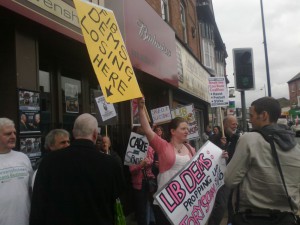Manchester Liberal Democrats Facing Election Losses
Article published: Thursday, May 5th 2011
Widespread anger over the coalition’s cuts mean the Liberal Democrats in Manchester and elsewhere are facing the prospect of important losses in today’s local elections.
Nick Clegg recently claimed he feels like a “punch-bag” as a result of the backlash against coalition policy. He should spare a thought for local Liberal Democrat activists and councillors who have been arguing his case on the doorsteps over the past few weeks.
Much has been made of the gulf separating the Orange Book Liberal Democrat leadership from its more left-leaning support base. The tensions between them flared at the party conference in March over the NHS and appeared to be blazing when Liberal Democrat councillors in Liverpool called for the party to leave the coalition. Prevented by the electoral system from turning votes into seats in parliament, the party’s strength lies in local government. However, if opinion polls are anything to go by, much of this will be eroded on 5 May.
Though the Liberal Democrats have never succeeded in toppling Labour in Manchester – they control just over one third of the 96 seats on the city council – there is still much for them to lose. Over the course of the Blair years, the party doubled its representation in the town hall from 19 seats in 1999 to a peak of 38 in 2004. The major catalyst was anti-war sentiment directed at Labour councillors, and at its height many in the party believed the council leadership was within their grasp.
The Rusholme ward in the south of the city, with a large Asian and student population, is a microcosm of the more general difficulties the party is facing. The Liberal Democrats gained complete control of the ward in 2004, but this now hangs in the balance, dependent on the re-election of their incumbent Abu Chowdhury, a prominent member of the Bengali community.
The Manchester Liberal Democrat deputy leader Paul Shannon admitted to me that campaigning in the ward has been challenging. Just as during the past decade the Liberal Democrats successfully tainted Labour councillors with their association with Blair’s wars, Labour candidates are enjoying the opportunity to do likewise to their opponents as regards Clegg’s cuts. “After 13 years of toeing the line over things like post office closures, ID cards, the war in Iraq, academy schools, 90 days detention without trial,” Shannon says, “now Labour are having fun, they’re letting their hair down.” He admits to having lost some of the party’s left-leaning voters, and calls tuition fees “an egregious example of how to lose people’s trust in one fell swoop”. Ultimately, his hope is that voters judge the party on its local record and, as he puts it, recognise “recent history didn’t begin in May 2010”.
Chowdhury’s opponent in Rusholme is Kate Chappel, a young, first-time candidate with a third-sector background, who is representative of Labour’s attempts to reinvent itself under Ed Miliband. She tells me the issue of the war still comes up: “We still hear it on the doorstep a lot,” she says, but feels that with new leadership and a new membership the party can begin to win back anti-war voters. “When you get a relatively young candidate like me, we can say to them in all faith that we agree on that issue.” The cuts are at the centre of her campaign, and she claims many former Liberal Democrat voters will be moving their support to Labour over the issue.
The story is the same elsewhere. The severity of the council’s budget cuts in Manchester – among the five worst in the country – have led to David Cameron and Miliband trading blows over the fate of the city. The sense of anger among residents from all walks of life is palpable, and though the Labour council have faced protests over their handling of the cuts, it is the Liberal Democrats who will likely suffer the most from it.
Rumours are circulating that even the party leader Simon Ashley will be losing his seat over the issue. In Levenshulme – another Liberal Democrat controlled ward that has seen vibrant anti-cuts campaigns, which both parties have tried to claim credit for – a visit from Vince Cable last month was met by an angry protest from residents. One of the protestors told me outside Cable’s meeting venue: “If they care about Levenshulme, they should just resign from the Lib Dems and stand as independents and we’d probably support them.”
The response has instead been to position themselves as defenders of local public services, curbing what they – alongside Cameron – claim to be excessively drastic measures taken by the Labour leadership. Their campaign leaflets assert that “Lib Dem councils like nearby Sheffield and Newcastle, as well as Lib Dem/Conservative run Birmingham are protecting the frontline services Labour in Manchester has chosen to cut” – a claim that is dubious at best. What the strategy really represents is the contradictory nature of today’s Liberal Democrat party; the leadership are tied firmly to the Tory’s harsh variant of economic liberalism, while the base try to cling onto more social democratic concerns and its position as the party of protest.
With Labour’s transition still primarily cosmetic – the warmongering and doctrinaire neoliberalism of New Labour can’t simply be brushed under the carpet – the position is vacant. Whatever the results on Thursday, real opposition to the dismantling of public services will ultimately come from organised movements outside the formal political process.
Andy Bowman
—————
This article is a modified version of one originally published by The Guardian’s Comment is Free.
More: Manchester, Opinion
Comments
No comments found
The comments are closed.




